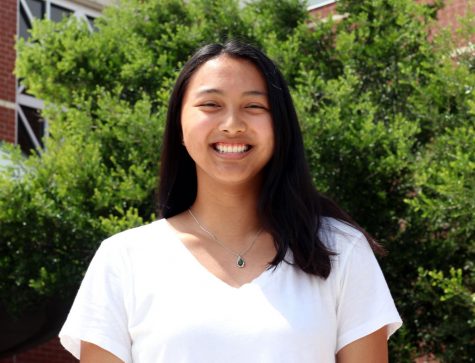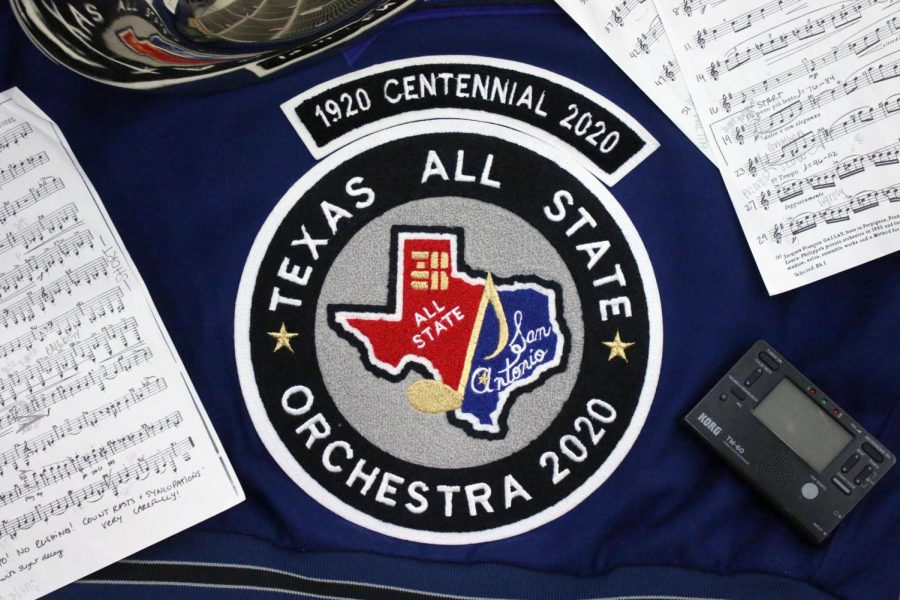Q&A: All-State musicians
Students across the state undergo a rigorous audition process in order to earn placement in Texas Music Educators Association (TMEA) ensembles. Students in fine arts programs have earned these placements, representing the school’s band, orchestra and choir programs. Following results, students are invited to attend the TMEA Clinic/Convention held in San Antonio. Due to COVID-19, the 2021 convention is being held virtually and students will not be able to attend an in-person convention; the 2021 convention will be held virtually from Feb. 11-13. “The Hawk Eye” asked some students to share their experiences with the audition process, preparation and more. Here’s what they had to say:
How did you prepare your audition material?
Sophomore violist Lauren Ahn: Every week, I would pick out spots I didn’t know how to play and I spent a couple hours working on those lines every day.
Junior soprano Ainsley Carmichael: This year, it was a lot of on my own practicing and doing virtual sectionals. I was doing a lot of singing on my own at home, learning and prepping the music that way.
Senior euphonium player Drew Pesina: I [continued] to do things I did last year. I started [preparation earlier] and continued to find new ways to [practice.] I didn’t worry about how fast I was learning the music, [and worried] more [about] how good I could get it to sound. I [made] long-term goals, such as I want [the music in this condition] by phase one, and I want it here by the time I get to area.
What was the most challenging part about preparation?
Ahn: The most challenging part was the recording. This year, we weren’t able to [audition] in person, so having to keep recording to make it perfect was the hardest part.
Carmichael: The motivation to [prepare] and the vocal tension [where my greatest challenges this year.] [The vocal tension] got really bad before the first round [of auditions;] I wasn’t able to talk or sing without pain.
Pesina: The toughest time to prepare [for All-State] is during marching season. You’re having to deal with the school workload and marching band – working would also take up evenings when I [could have been] practicing.
How was your preparation influenced by COVID-19?
Ahn: It was more nerve wracking last year, [since we] had to go in [person.] This year, I could play to my best potential [because of] recording.
Carmichael: Usually we have camps in the summer where you’ll go and [prepare] for all-state. We’ll have clinics and you get to sing with everybody, see people and meet new people. You really get that musical experience where you get to improve with [others.] Since that didn’t happen this year, there was a lot of trying to find the inner drive to work for it.
Pesina: I didn’t [have to] worry about preparing myself before an audition, nerve [wise.] There’s still a mindset to [auditioning,] like not trying to be a perfectionist on recordings, [but] I just wanted to make music.
What is something you’ve gained from undergoing this audition process?
Ahn: I gained more perspective on how to practice. Because of this long process of trying to practice every day consistently, I found more ways to learn the notes.
Carmichael: The ability to push through — this has been unlike anything I’ve done [in] my entire life.
Pesina: I’ve gained a good understanding of how to adapt to change, accept it and not go against it.
How has the All-State process allowed you to grow as a musician?
Ahn: [This process] has taught me to not compare myself to other people, but to compete with myself. I try to not think about how others are playing, more like I’m going to try to compete with [my best potential.]
Carmichael: [All-State] really [allows you to] work on core skills. You go back to the beginning, you have to go back and perfect all the little things so you can apply those [skills.]
Pesina: [The All-State process] has definitely expanded my musicality. The etudes are challenging and you learn a new skill every time you play a different etude; it definitely teaches you new aspects of musicianship.
What advice would you give to someone currently undergoing this process?
Ahn: Practice to your fullest extent with no regrets, play for yourself [and] don’t compare yourself to others. Even if you don’t get the results you want, think of it as a good learning experience [and] motivation.
Carmichael: Don’t give up. I know that whenever you’re in the process, all you want to do is quit. You don’t want to do it because it’s not something that you enjoy doing — the all-state process is not something that anybody likes to do — but you’re going to improve so much; you’re going to learn how to keep going and motivate yourself to get through things like this.
Pesina: Start early, but don’t rush. Take your time with this, you have more time than you think. You have to work it up and go with yourself. Don’t go with anyone else, just worry about yourself.
What are you most looking forward to at the 2021 convention?
Ahn: I heard there will be professors at the convention, so I’m wanting to ask why they have a passion for what they do in music.
Carmichael: I’m really looking forward to seeing what scholarship opportunities they [have to offer.]
Pesina: I’m looking forward to going to other clinics I haven’t been able to go to in the past. Last year, we’d be at rehearsal when clinicians were teaching. Now that there’s no rehearsal for the bands, we’ll get to watch the clinicians speak and go watch other performances that we wouldn’t [normally] be able to see.
Do you have future plans regarding music?
Ahn: I think I want to pursue a major in music and maybe performance.
Carmichael: I’m currently looking into vocal performance and possibly speech therapy or speech education to go along with it.
Pesina: I intend on pursuing music education at the university level. I’m still picking which school I want to go to, but it’s definitely something in my future.
What does music mean to you?
Ahn: Music to me is art. It [allows] me to escape from reality when I’m playing. It’s a form of art that is very expressive and is my life.
Carmichael: Music is just [something] that has always been in my life. My dad was a musician, my grandparents are musicians, [so] it means a lot to me. If it wasn’t in my life, I can’t even describe how different my life would be. It means the world to me.
Pesina: Music means life to me; it is my top escape. It’s very life changing and it’d be a lot harder for us to share our stories and our feelings with each other [without music.] I think without music in the world, it’d be a very different place.

Senior Andie San Luis is the editor-in-chief and this is her second year on staff. She spends copious amounts of time on Spotify, plays the french horn...



